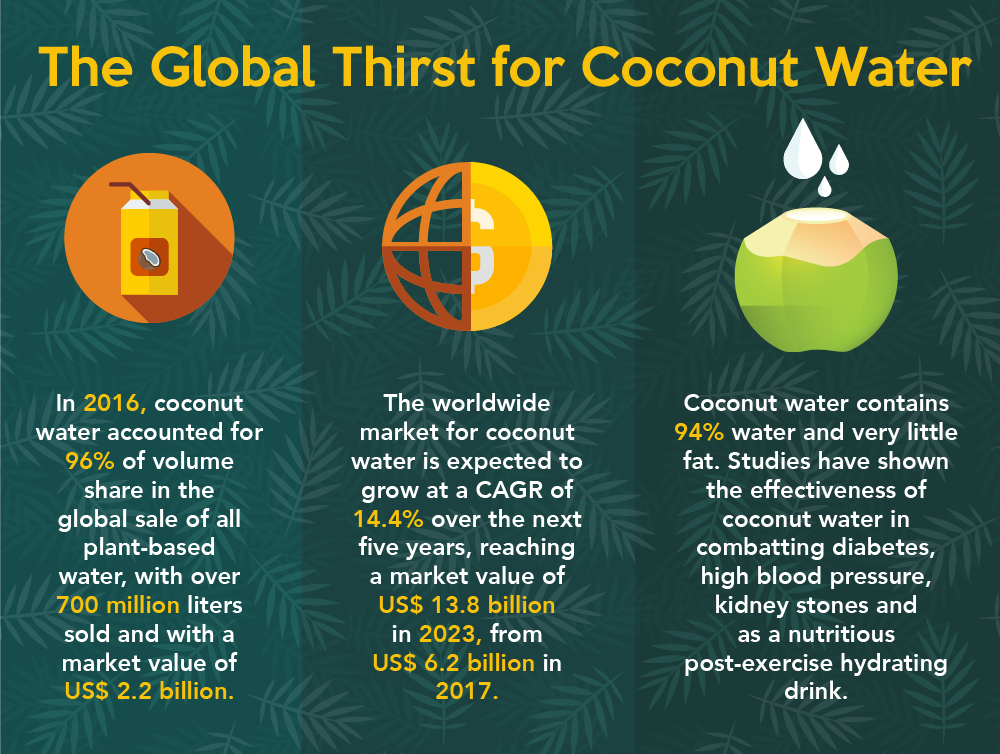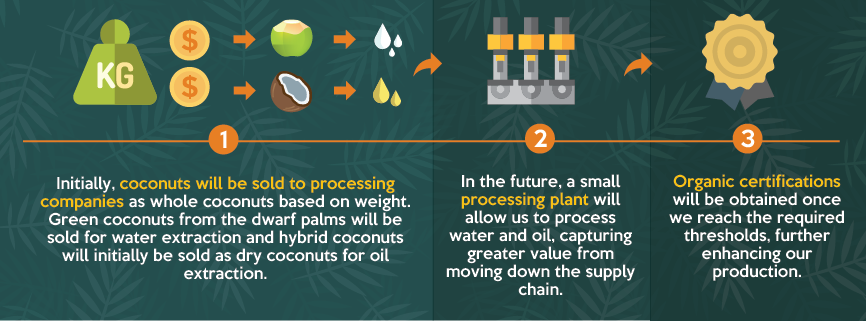Coconuts have become a very valuable commodity in recent years, with products such as coconut water, oil and milk having gained major popularity in the global food and beverage, healthcare, and beauty industry. In response to this demanding consumer market, the Brazilian Corporation Embrapa Food Agroindustry recently developed an edible, biodegradable film that can be applied to coconuts in order to extend the shelf life of the product up to four times. Further feeling the demand for coconuts, this new technology will open many doors for the Brazilian coconut industry and allow Brazilian producers like Primal to break into the worldwide market.
Coconut is a widespread crop that is grown in more than 80 countries, with an estimated global production of around 55 million tons. Market research analysts predict the global virgin coconut oil market size to grow steadily at a CAGR of around 10% by 2021, while the global coconut milk market is expected to grow with a CAGR of 13.5% over the period of 2017-2023. However, these two sectors are just the tip of the iceberg, as coconut water continues to be the strongest growing sector and leading plant-based water for sale worldwide.

Coconut water is extracted from green coconuts, predominantly from dwarf trees, which account for 85% production of the total coconut water market globally. These fresh green coconuts have an average shelf life of around 10 days, and stand to become the greatest beneficiary of the newly developed biodegradable film. Developed with the help of a Brazilian entrepreneur who had spent years searching for a technology that would increase the shelf life of green coconuts in order to export them to Europe, this new technology keeps the nutritional characteristics of the fresh coconut and the water, without changing their color or flavor. During the application of the technology, the fruits are cleaned and then immersed in a filmogenic solution based on polysaccharides and other composites, which contribute to reducing microbial activity while maintaining nutritional value. After the coating is dry, the product is ready to be packed and stored for export or trade in the national market.
The global demand for coconuts has had an inverse relationship with global supply. Today, the main coconut producing countries are in Asia: the Philippines, Indonesia and India account for 71 percent of global production. However, producers in these countries face a serious problem: with coconut trees having a productive life of between 30 and 40 years, many trees in Asia are already past their maximum productivity. As a result, their production will decrease by more than 80 percent in the next decade. Combined with a lack of replacement trees, this is further fueling a market imbalance, opening up the market for competitor nations like Brazil.
Coconut growing is especially important for the economies of northeastern and northern Brazil, where our plantations are located. They account for approximately 82% of the country’s production, and Brazil ranks fourth among the coconut producing countries in the world. While coconut plantations in developing countries are typically managed by smallholders, that lack resources and economies of scale, Brazilian producers have the necessary infrastructure to produce quality coconuts at a large scale.
Poised to become a leader in the global coconut market with 578.3 acres (234 hectares) of dwarf and hybrid coconut trees, Primal plans to build a facility for coconut water and oil processing.

Despite being a commodity and prone to cyclical super cycles across the international markets, both coconut water and coconut oil are expected to show stable growth for the future, fueled by the increase in demand for coconut derived products. The increasing demand for organic products in the western world will further allow us to sell our coconuts at a higher premium, guaranteeing higher returns for our investors, and giving us a clear competitive advantage in the global market.
At the forefront of profitable and sustainable agriculture, our organic and innovative agricultural techniques help us protect the environment, while also creating value for our stakeholders. Learn more about our projects and how you can become a part of Primal by clicking here.